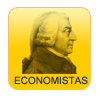Paul A. Samuelson (1915-2009)
Premio Nobel  1970
1970
Paul Anthony Samuelson es un economista americano, nacido en Gary, Indiana. Obtuvo el Premio Nobel de EconomĂa en 1970, por el trabajo cientĂfico a travĂ©s del cual ha desarrollado la teorĂa econĂ³mica estĂ¡tica y dinĂ¡mica y contribuido activamente a elevar el nivel del anĂ¡lisis en la ciencia econĂ³mica.

Es autor del manual de economĂa mĂ¡s vendido de la historia, que, ademĂ¡s de hacerlo extraordinariamente rico, ha servido para formar muchas generaciones de economistas de todo el mundo.
AdemĂ¡s de pedagogo y divulgador, tiene muchas aportaciones originales. EstĂ¡ especialmente interesado en los aspectos dinĂ¡micos de la economĂa. Su principal mĂ©rito es quizĂ¡ haber realizado la llamada "sĂntesis neoclĂ¡sica", es decir, la fusiĂ³n en un conjunto coherente de la economĂa de Keynes con la de sus predecesores.
FalleciĂ³ en Belmont, Massachusetts, el 13 de diciembre de 2009
Vea también:
-
Alfredo FĂ©lix Blanco
Paul A. Samuelson: Una vida dedicada a la economĂa -
Un texto breve en español de Paul A. Samuelson:
Interrelaciones entre el anĂ¡lisis por medio del multiplicador y el principio de aceleraciĂ³n (1939)
Obras
"Some Aspects of the Pure Theory of Capital", 1937, QJE.
"A Note on Measurement of Utility", 1937, RES.
"A Note on the Pure Theory of Consumer's Behaviour", 1938, Economica.
"Numerical Representation of Ordered Classifications and the Concept of Utility", 1938, RES.
"Interaction Between the Multiplier Analysis and the Principle of Acceleration", 1939, RES.
"The Stability of Equilibrium: Comparative statics and dynamics", 1941, Econometrica.
"Constancy of the Marginal Utility of Income", 1942, in Lange et al, editors, Studies in Mathematical
Economics.
"The Relation Between Hicksian Stability and True Dynamic Stability", 1944, Econometrica.
Foundations of Economic Analysis, 1947.
"Some Implications of Linearity", 1947, Econometrica
"Consumption Theory in Terms of Revealed Preference", 1948, Economica
Economics: An introductory analysis, 1948.
"International Trade and the Equalisation of Factor Prices", 1948, EJ.
"International Factor-Price Equalisation Once Again", 1949, EJ.
"The Problem of Integrability in Utility Theory", 1950, Economica.
"Probability and the Attempts to Measure Utility", 1950, Economic Review.
"Evaluation of Real National Income", 1950, Oxford EP.
"Abstract of a Theorem Concerning Substitutability in Open Leontief Models", 1951, in Koopmans, editor, Activity Analysis of Production and Allocation.
"Economic Theory and Mathematics: An appraisal", 1952, AER
"Spatial Price Equilibrium and Linear Programming", 1952, AER.
"Prices of Factors and Goods in General Equilibrium", 1953, RES.
"Consumption Theorems in Terms of Overcompensation Rather than Indifference Comparisons", 1953, Economica.
"Balanced Growth under Constant Returns to Scale", with R.M. Solow, 1953, Econometrica.
"Utility, Preference and Probability", 1953, Econometrie.
"The Pure Theory of Public Expenditure", 1954, REStat.
"Diagrammatic Exposition of a Theory of Public Expenditure", 1954, REStat.
"Social Indifference Curves", 1956, QJE.
"A Complete Capital Model Involving Heterogeneous Capital Goods", with R.M. Solow, 1956, QJE.
"Wages and Interest: A modern dissection of Marxian economic models", 1957, AER.
"An Exact Consumption-Loan Model of Interest with or without the Contrivance of Money", 1958, JPE.
Linear Programming and Economic Analysis with R.Dorfman and R.M. Solow, 1958.
"Aspects of Public Expenditure Theory", 1958, REStat.
"Reply to Lerner", 1959, JPE
"Analytical Aspects of Anti-Inflation Policy", with R.M. Solow, 1960.
"Efficient Programs of Capital Accumulation in Terms of the Calculus of Variations", 1960, in Arrow, Karlin and Suppes, editors, Mathematical Models in Social Science.
"Parable and Realism in Capital Theory: The surrogate production function", 1962, RES.
"Proof that Properly Anticipated Prices Fluctuate Randomly", 1965, Industrial Management Review.
"Rational Theory of Warrant Pricing", 1965, Industrial Management Review.
"A Theory of Induced Innovation along Kennedy-Weizsacker Lines", 1965, REStat.
"Using Full Duality to Show that Simultaneously Additive Direct and Indirect Utilities Implies Unitary Price Elasticity of Demand", 1965, Econometrica.
"A Catenary Turnpike Theorem Involving Consumption and the Golden Rule", 1965, AER.
"Economic Forecasting and Science", 1965, Michigan Quarterly Rev (extracts)
"The Non-Switching Theorem is False, with D.Levhari, 1966, QJE.
"A Summing Up", 1966, QJE.
"The Pasinetti Paradox in Neoclassical and More General Models", with F. Modigliani, 1966, RES.
"General Proof that Diversification Pays", 1967, J of Finance and Quantitative Analysis.
"What Classical and Neoclassical Monetary Theory Really Was", 1968, Canadian JE.
"Lifetime Portfolio Selection by Dynamic Stochastic Programming", 1969, REStat.
"The Fundamental Approximation Theorem of Portfolio Analysis in Terms of Means, Variances and Higher Moments", 1970, RES.
"Understanding the Marxian Notion of Exploitation: A summary of the so-called transformation problem between Marxian values and competitive prices", 1971, JEL.
"Unification Theorem for the Two Basic Dualities of Homothetic Demand Theory", 1972, Proceedings of NAS.
"Maximum Principles in Analytical Economics", 1972, AER.
"Marx as a Mathematical economist", 1974, in Horwich and Samuelson, editors, Trade, Stability and Macroeconomics.
"Complementarity: An essay on the 40th Anniversary of the Hicks-Allen Revolution in Demand Theory", 1974, JEL.
"The Canonical Classical Model of Political Economy", 1978, JEL.
Collected Scientific Papers, five volumes,1966-86.
"Our Wassily: W.W. Leontief (1905-1999)"



| En eumed.net: |
 1647 - Investigaciones socioambientales, educativas y humanísticas para el medio rural Por: Miguel Ángel Sámano Rentería y Ramón Rivera Espinosa. (Coordinadores) Este libro es producto del trabajo desarrollado por un grupo interdisciplinario de investigadores integrantes del Instituto de Investigaciones Socioambientales, Educativas y Humanísticas para el Medio Rural (IISEHMER). Libro gratis |
15 al 28 de febrero |
|
| Desafíos de las empresas del siglo XXI | |
15 al 29 de marzo |
|
| La Educación en el siglo XXI | |




